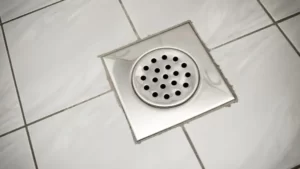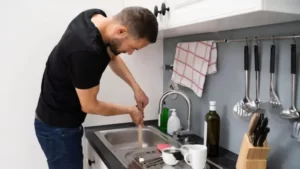Dealing with a clogged drain is a common and frustrating household problem. Whether it’s a clogged sink, bathtub, or shower drain, the inconvenience and potential water damage can be a significant headache. While calling a professional plumber is always an option, you may be surprised to learn that many drain blockages can be cleared with simple do-it-yourself (DIY) techniques. In this blog post, we will explore six practical DIY drain cleaning tips that can help you remove a clogged drain and restore water flow in your home.
Understanding the Causes of Drain Blockages
Dealing with a clogged drain can be a frustrating experience for homeowners in Braintree, MA. To effectively address this common household issue, it’s essential to understand the underlying causes of drain blockages. By identifying the root causes, residents can take preventive measures to minimize future clogs and ensure a smoothly running plumbing system. One of the primary causes of drain blockages in Braintree, MA, is the accumulation of debris and residue in the pipes. Over time, substances such as hair, soap scum, grease, and food particles can build up and create stubborn clogs. It’s essential to be mindful of what goes down the drain and to use drain filters or screens to catch potential blockage-causing materials.
Another common cause of drain blockages is tree root intrusion. Braintree, MA, a green and lush area, has numerous trees with extensive root systems. These roots can find their way into sewer lines and drains, causing obstructions and hindering the smooth flow of wastewater. Regular inspection and maintenance of sewer lines can help detect tree root intrusion early and prevent significant blockages. Furthermore, over time, outdated plumbing systems or deteriorated pipes can contribute to drain blockages in Braintree, MA. Older homes may have clay or cast iron lines, which are more susceptible to corrosion and damage. As these pipes degrade, they can develop cracks, breaks, or collapses, leading to blockages and reduced water flow.

Boiling Water and Baking Soda
If you have minor blockages in your pipes caused by soap scum or grease buildup, an affordable and simple way to unclog them is by combining baking soda and boiling water. Begin by pouring half a cup of baking soda down the drain, followed by a cup of boiling water. Wait several minutes before pouring more boiling water down the drain to remove any remaining debris. It’s important to note that this method is unsuitable for stubborn clogs. You may need to repeat the process or use other methods like a plunger or drain snake for more challenging obstructions.
When attempting any DIY plumbing solutions, taking appropriate safety measures is crucial. Wear protective gloves and eyewear, ensure adequate ventilation, and never mix different cleaning agents, as they can produce harmful fumes. If all else fails, it’s best to seek professional help from experienced plumbers who can handle tough clogs effectively. Remember that prevention is always better than cure for clogged drains. Avoid pouring grease or oil down the drain, and use hair catchers in shower and bathtub drains to prevent hair buildup. These preventive measures will save you time and money in the long run.
Vinegar and Baking Soda Solution
A clogged drain can be a frustrating problem, but a vinegar and baking soda solution is an easy and effective method for unclogging drains. This chemical reaction helps break down stubborn blockages that lead to slow drainage in the bathroom and kitchen sinks, and shower drains. Before using this method, pouring a pot of boiling water down the drain is advisable to loosen any buildup. Then, pour half a cup of baking soda and one cup of white vinegar into the drain. Cover the drain with a plug or cloth to prevent the mixture from bubbling, and let it sit for 15-20 minutes. Finally, pour another pot of boiling water down the drain to remove any remaining debris.
It should be noted that this method may not work for severe clogs or blockages caused by solid objects like toys or jewelry. In such instances, calling a professional plumber is recommended to avoid any damage to your pipes. To prevent future clogs and keep your lines running smoothly, regular maintenance, such as using a drain strainer and avoiding pouring grease or oil down the drain, is necessary. By following these simple steps, you can save time and money on costly plumbing repairs while keeping your home’s plumbing system in good condition.
The Plunger Method
A plunger is an essential tool for any homeowner to have in their arsenal of plumbing supplies. To effectively clear a clogged drain, it’s necessary to use the proper technique and create a strong seal. Start by filling the sink or tub with enough water to cover the bottom of the plunger cup. Then, position the plunger over the drain and press down firmly to create a tight seal. Rapidly push the plunger up and down several times to create suction pressure that can dislodge blockages. If your initial efforts are unsuccessful, you may need to adjust your technique or apply more forceful plunging. Be sure to avoid using harsh chemical drain cleaners, as they can corrode your pipes over time.
If these methods still don’t work, it may be time to call a professional plumber with specialized tools like hydro jetting equipment to remove stubborn blockages. Remember, regular maintenance is key to preventing clogs in your drains. Avoid pouring grease, coffee grounds, hair, or other debris down your drains, as these materials can accumulate and lead to blockages over time. By taking proactive measures and utilizing effective plunging techniques when necessary, you can keep your drains flowing smoothly and avoid costly plumbing repairs in the future.
Using a Drain Snake
When simple methods fail to clear stubborn clogs, a drain snake (a plumber’s snake) can be handy. This flexible tool is designed to reach deep inside the drainpipe and unclog blockages that are hard to remove. However, using a drain snake requires proper handling to be effective. First, insert the snake into the drain until you feel resistance from the clog.
Then, gently rotate the handle while applying pressure until you feel the snake break through the blockage. Once you’ve cleared the clog, slowly remove the snake while running hot water down the drain to flush out any remaining debris. It’s also essential to note that different types of drain snakes are available for different types of drains and clogs. For instance, a handheld drill is ideal for small sink drains, whereas a larger motorized auger is best for clearing main sewer lines. Using the wrong type of snake can cause damage to your plumbing system or worsen the clog.
Additionally, wearing protective gear such as gloves and goggles when handling a drain snake is crucial to avoid injury from flying debris or splashing water. Lastly, prevention is always better than cure for drain clogs. Avoid pouring grease, oil, or food scraps down your sink drains, and use hair catchers in your shower or bathtub drains to prevent hair buildup. Regularly flushing your drains with hot water and baking soda can also help clear them of debris and minimize the chances of persistent clogs.
Homemade Drain Cleaning Solutions
Apart from vinegar and baking soda, there are several other natural DIY solutions that you can use to unclog your drains. Salt and hot water are a popular combination to loosen up any blockages in the drain. Lemon juice is also an effective cleaning agent due to its high acidity. Cream of tartar is another household ingredient that can help remove stubborn grime and buildup inside your pipes. These natural remedies work best for different types of clogged drains. For instance, salt and hot water are ideal for grease buildup in the kitchen sink, while lemon juice works well on bathroom sinks and shower drains with soap scum buildup.
Cream of tartar is excellent for removing rust stains or mineral deposits from metal pipes. When using these natural cleaners, it’s essential to follow the instructions carefully and avoid mixing different ingredients, as this could cause dangerous chemical reactions. Remember to use protective gear such as gloves and goggles when handling these substances. By incorporating these simple yet effective DIY solutions into your cleaning routine, you can save money while keeping your drains clean and unclogged.

Prevention and Maintenance
Blocked drains are a common household problem that can lead to significant inconvenience and costly repairs. However, by taking some simple preventative measures and implementing regular maintenance routines, you can significantly reduce the likelihood of encountering clogged drains in the future. One effective strategy for preventing drain blockages is to avoid flushing non-degradable items down the toilet or sink. This includes wet wipes, sanitary products, and cooking grease.
Additionally, using a hair catcher in your shower or bathtub can prevent hair from accumulating in the drain and causing a blockage. Another effective strategy for maintaining a healthy plumbing system is to schedule regular drain cleaning services from a professional plumber. These routine cleanings can help remove any buildup of debris or mineral deposits that could eventually cause a blockage. Finally, it’s essential to be mindful of your water usage habits and avoid overloading your plumbing system with excessive amounts of water at one time.
Conclusion
Dealing with a clogged drain can sometimes require the help of a professional plumber. With the proper DIY techniques and a little know-how, you can clear most drain blockages and restore adequate water flow in your home. From using boiling water and baking soda to employing vinegar and baking soda solutions, plungers, drain snakes, and homemade drain cleaning remedies, you now have a toolkit of effective methods to tackle clogs. Remember to prioritize prevention and maintenance to keep your drains flowing smoothly. At Clear Choice Drain Solutions in Braintree, MA, we understand the importance of maintaining healthy plumbing systems. Our team of experienced professionals can provide regular drain cleaning services and offer expert advice on preventing clogs and maintaining your plumbing system for optimal performance. Contact us today to schedule a consultation and keep your drains flowing smoothly for years!


